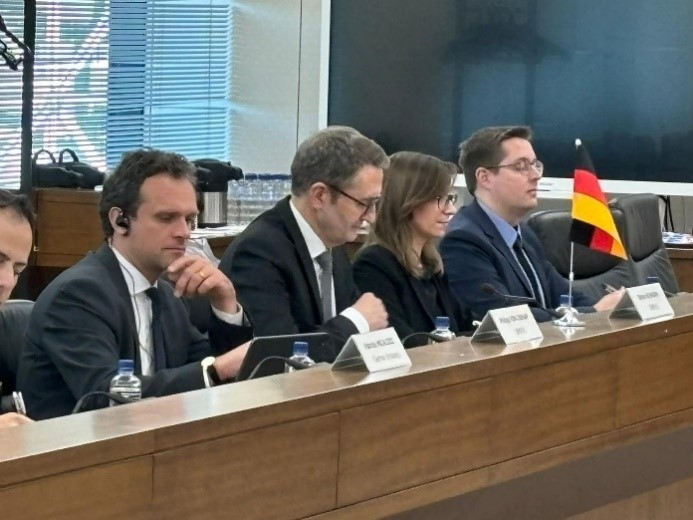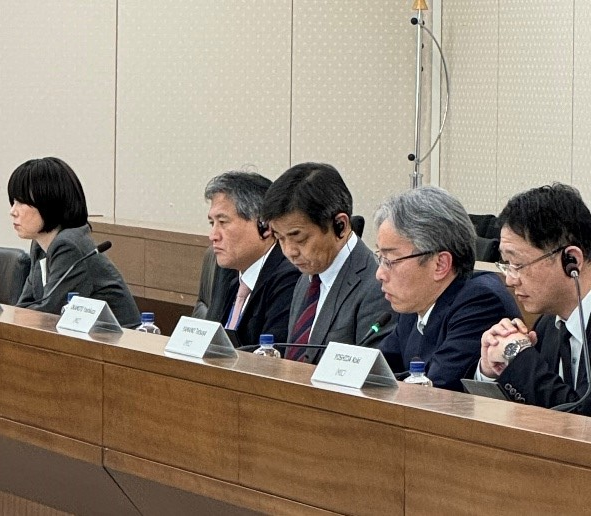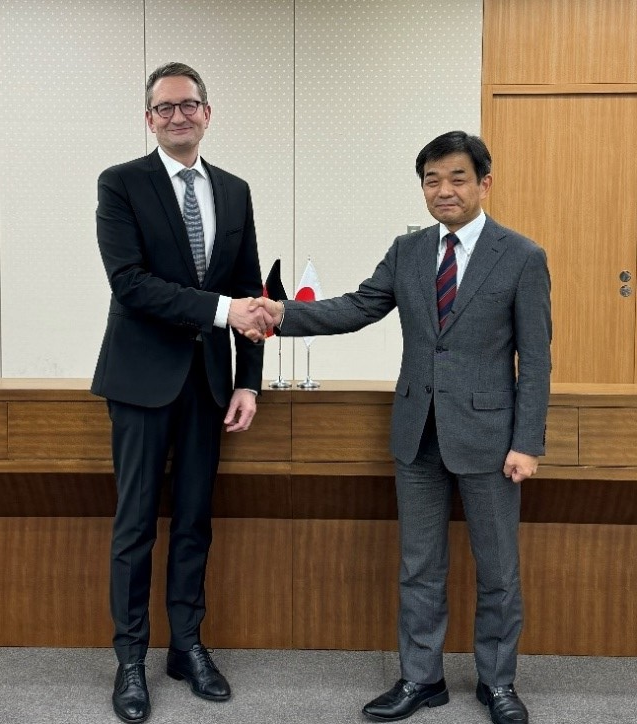December 2, 2024 Outcomes of the 8th Japan-Germany ICT Policy Dialogue
The Ministry of Internal Affairs and Communications held the 8th Japan-Germany ICT policy dialogue in Tokyo on Thursday, November 28 with the Federal Ministry for Digital and Transport (Bundesministerium für Digitales und Verkehr in German, abbreviated as BMDV) and other Ministries of Germany. This policy dialogue aims to deepen the mutual understanding between Japan and Germany on policy aspects in the field of ICT and promote the collaboration and cooperation of the two countries.
In this policy dialogue, the two governments shared their efforts on a wide range of topics related to ICT and confirmed further cooperation. In addition, public-private sessions were held, and the participants engaged in lively discussion.
Following the outcomes of this meeting, Japan and Germany will discuss specific measures to further deepen cooperation between the two countries.
In the 8th policy dialogue, the following topics were mainly discussed, based on policy and R&D trends in both Japan and Germany, as well as public-private initiatives.
i. Secure and open telecom network
Amidst the increasing importance of the safety of digital infrastructure, the Japanese side explained the status of development of digital infrastructure including 5G, various measures for the spread of Open RAN, and efforts to secure the safety of essential infrastructure.
On the German side, the Federal Ministry of the Interior and Community (Bundesministerium des Innern und für Heimat in German, abbreviated as BMI) explained its efforts to strengthen the security of the 5G mobile network as a key infrastructure in Germany, while the BMDV explained the efforts of the "i14y Lab", the German Open Testing & Integration Centers, and its cooperation with the O-RAN Alliance.
Both sides welcomed the announcement regarding the commercial deployment of Open RAN by a German mobile operator, and confirmed the importance of ensuring the safety of communication networks by using technologies such as Open RAN.
ii. Beyond 5G/6G
The Japanese side explained the "Strategy for Realizing Next-Generation Information and Communication Infrastructure to Support AI Society - Beyond 5G Promotion Strategy 2.0 -" announced in August this year and the Beyond 5G(6G) R&D Fund. On the German side, the Federal Ministry of Education and Research (Bundesministerium für Bildung und Forschung in German, abbreviated as BMBF) introduced 6G R&D efforts in Germany for 2030 and the "Berlin 6G Conference" held annually in Berlin.
Both sides also shared information on the progress of the Japan-Germany international joint research project being promoted by Japan and Germany and the workshops being held with the NICT, and shared the view to deepen the cooperative relationship further.
iii. Measures against dis-/mis-information
As initiatives for preventing dis-/mis-information on the Internet, the Japanese side introduced the content of discussions at the "Study Group on How to Ensure Soundness of Information Distribution in Digital Space " and the development and demonstration of technology for preventing dis-/mis-information. The German side explained initiatives such as the application of the Digital Service Act (DSA) within Germany, enhancement of platform literacy, fact-checking activities, and measures for this year's European Parliament election.
Both sides shared the recognition that measures against dis-/mis-information are an international issue, and shared the view that they would exchange views on practical efforts while giving consideration to freedom of expression.
iv. AI
The Japanese side explained the progress of the "Hiroshima AI Process" and the " AI Guidelines for Business" compiled in April this year. The German side explained the situation of its application of the EU AI Act, which entered into force in August this year, and the initiatives of the European Commission, including the establishment of the AI Office.
Both sides shared the importance of implementing the Code of Conduct of the Hiroshima AI Process, and confirmed that they would deepen cooperation to promote safe, secure and trustworthy AI through the expansion of the "Hiroshima AI Process Friends Group".
v. Metaverse
The Japanese side introduced discussions at the G7, IGF, etc. and the "Principles of the Metaverse (Version 1.0)" formulated in October this year, and the German side explained cooperation with the European Commission and the OECD.
Both sides confirmed the importance of international cooperation for the global development of the metaverse.
vi. Public-private sessions
Representatives of private companies, research institutions, and industry associations from both Japan and Germany participated in the public-private sessions on the themes of (a) 5G/Open RAN, (b) new technologies in communication networks such as B5G/6G and All Photonics Network (APN), and (c) public-private partnership between Japan and Germany.
Each company and organization explained their respective projects and the current initiatives for Japan-Germany cooperation, held discussions based on the challenges they face in their actual business and R&D, and confirmed that the public and private sectors would work together to further deepen Japan-Germany cooperation.
(Reference) Attendees of the 8th Japan-Germany ICT Policy Dialogue
From Japan: Dr. IMAGAWA Takuo, Vice-Minister for International Affairs, MIC, and others
From Germany: Mr. Stefan Schnorr, State Secretary of BMDV, officials of BMI and BMBF, and others.
 |
 |

Contact
For further information about this press release, please fill in the inquiry form and submit it to MIC on the website
https://www.soumu.go.jp/common/english_opinions.html
Global Strategy Division, Global Strategy Bureau, MIC
TEL: +81 3 5253 5920
FAX: +81 3 5253 5924
